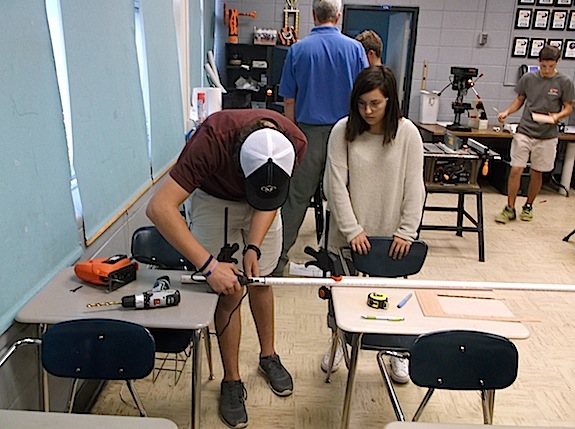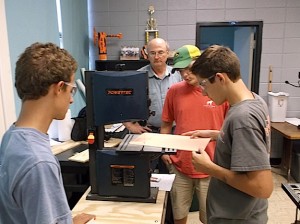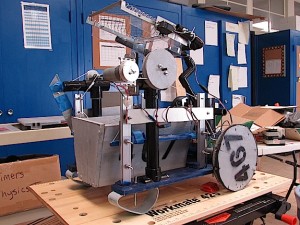DMS robotics takes second at Shelton State competition

For the third year in a row — and since the group started — the Demopolis Robotics Team placed second in the BEST Robotics competition at Shelton State Oct. 31.
As in past years a second place finish makes the team eligible to advance to regional competition at Auburn University Dec. 5-6 against more than 50 other teams throughout the southeast. The students have hopes of improving its past performance of 26th place in 2014 and 31st in 2013.
Team sponsor Ashley Brock, Demopolis Middle School science teacher, has directed the group since its start and is really pleased with how well the students have matured.
This year the team has students from grades 7 through 10, some of whom have been with the group since its first year. Because of the growing interest, however, some students had to be turned away so the team could be limited to 30.

To mimic the “real world,” each one had to go through an interview process as if being hired for a job, and they are required to keep up their grades.
“It’s a huge time commitment,” Brock said. She often brought her two young children to school after hours as the team worked long hours to complete their assignments.
The competition involves far more than construction of a robot and having it perform. All facets of design and marketing are included. Demopolis brought home several awards from the most recent event.
At Shelton State, they won first in both spirit and booth exhibit; second for Devin Daniels’ engineering notebook; third in marketing, and fourth for the robot “Dig-i-tron 2015.”
Brock can see the difference now that everyone is more experienced. “We are a lot more organized,” she said. “As a team we were departmentalized.”

She gives plenty of thanks to her “terrific mentors.” They include Elizabeth Smith with marketing; Amanda Barnes, booth; Chris Stewart and Jimmie Lee, engineers with Georgia-Pacific; Jacob Acker and Coleton Baught, co-op students from WestRock, and Mark McVay, who helped construct the practice game field.
She noticed this year that the mentors are beginning to step back and let the older students guide the younger ones.
“I like what it’s evolving into,” she said.
The whole process flowed smoother. “We know more about what we’re doing,” Brock explained. Three years ago it took days to figure out how to construct a pulley. Now, it’s second nature.
The team is using the four weeks between competitions to tweak everything and study the judges’ comments.
As for the Dig-i-Tron, they are trying to make it faster and change strategy.
This year’s challenge is simulated mining. The robot must pick up and deliver diverse products, receiving points for the difficulty and completion of each one. As the rounds of competition continued, the team had to adapt to “market shifts.”
Organizers “try to make it very real world,” Brock said.
She hopes to advance the program, by setting up an internship or apprentice program with 7th graders in the future to help them catch on quickly to the basic engineering skills needed for the competition. The team also does outreach to elementary school, and Brock holds summer camp in order to keep interest and attract newcomers to the program.

